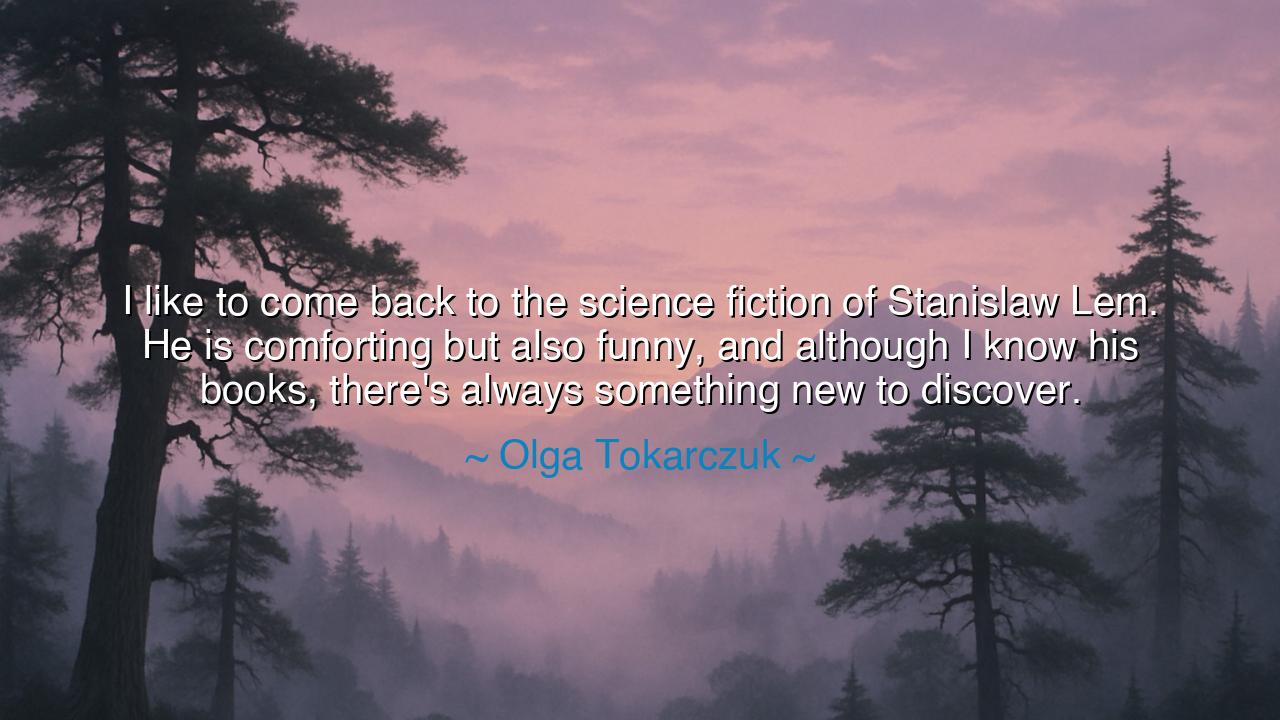
I like to come back to the science fiction of Stanislaw Lem. He
I like to come back to the science fiction of Stanislaw Lem. He is comforting but also funny, and although I know his books, there's always something new to discover.






The words of Olga Tokarczuk—“I like to come back to the science fiction of Stanislaw Lem. He is comforting but also funny, and although I know his books, there’s always something new to discover.”—speak to the eternal relationship between memory, wisdom, and rediscovery. In them lies a timeless truth: that the greatest works of the human spirit, like the vastness of the cosmos itself, cannot be exhausted by a single reading, a single lifetime, or a single understanding. Tokarczuk, herself a Nobel laureate and seeker of human mystery, honors Lem—the great philosopher of the future—for creating worlds that reflect not only stars and machines, but also the infinite depths of the human soul. Her words remind us that true art, like true knowledge, is a living entity that changes with us, revealing new dimensions each time we return to it.
When she says that Lem is “comforting but also funny,” she reveals the paradox at the heart of all wisdom. Lem’s humor, sharp and cosmic, arises not from mockery but from perspective—from seeing how small and strange humanity appears against the backdrop of eternity. His comfort does not come from ease, but from recognition: the recognition that even amid absurdity, we are part of a vast, mysterious order. In his laughter, there is compassion; in his irony, there is tenderness. This union of intellect and humor, of depth and play, is what Tokarczuk calls comforting: for through his words, the human condition becomes bearable, even noble, because it is understood.
The origin of her admiration lies in their shared inheritance of Central European thought—a region where philosophy, suffering, and imagination have long intertwined. Lem, writing from Poland in the shadow of war and totalitarianism, used science fiction not as escapism, but as revelation. His stories, though filled with machines and planets, were meditations on knowledge, morality, and the limits of understanding. Tokarczuk, whose own novels explore the mystical and the interconnectedness of life, finds in Lem a kindred spirit—a thinker who gazed into the unknown not to dominate it, but to humble the human ego before the mystery of existence. For her, returning to Lem is like returning to a wise ancestor: familiar, yet endlessly profound.
This idea—that something known can still feel new—is one of the most sacred lessons in art and in life. The ancient philosopher Heraclitus once said, “No man ever steps in the same river twice, for it is not the same river, and he is not the same man.” So it is with the works of Lem, and with every encounter of the soul with truth. When Tokarczuk re-reads his books, she discovers not only what he wrote, but what she has become. The words remain the same, but her perception, deepened by time and experience, transforms their meaning. Thus, discovery is not found in novelty alone, but in renewed perception—in the courage to return and see again.
Consider the example of Marcus Aurelius, who carried with him his own writings, the Meditations, as a source of strength through years of war and burden. Though he knew his own words by heart, he returned to them constantly, for he understood that the act of reading, like the act of living, is never static. Each return to a familiar thought revealed something unseen before. Like Tokarczuk with Lem, Marcus did not seek entertainment but enlightenment through recurrence—the deep comfort of confronting the same truths from new vantage points, as one might gaze upon the same mountain under changing skies.
In Tokarczuk’s reflection, there is also a reverence for the continuity of the human mind—the thread that binds generations of thinkers, dreamers, and storytellers. Lem explored the outer universe to illuminate the inner one; Tokarczuk explores the inner world to understand the outer. Together, they represent a lineage of artists who remind us that imagination is not escape—it is revelation. To return to their works is to drink again from a living spring, whose waters are never the same, yet always nourishing.
From this, we may draw a lesson for the seeker of wisdom: return often to the things that have shaped you. Revisit the books, the music, the places that once stirred your soul. You will find that they have grown with you, or perhaps, that you have grown enough to finally meet them fully. Do not rush always toward the new, for the eternal hides within the familiar. The truly wise do not flee from repetition; they find infinite depth in the act of returning.
So, my friends, let Tokarczuk’s words be your guide: cherish those creators, thinkers, and ideas that continue to reveal new light across the years. Let the laughter of Lem remind you that even the cosmos can smile, and that humour, like wisdom, is born of perspective. For when you can look again at what you already know and still find wonder, then you have understood what it means to be alive. And like the great souls before you, you too will discover that the journey to truth is not a straight path forward, but a circle ever widening—returning, deepening, illuminating, without end.






AAdministratorAdministrator
Welcome, honored guests. Please leave a comment, we will respond soon